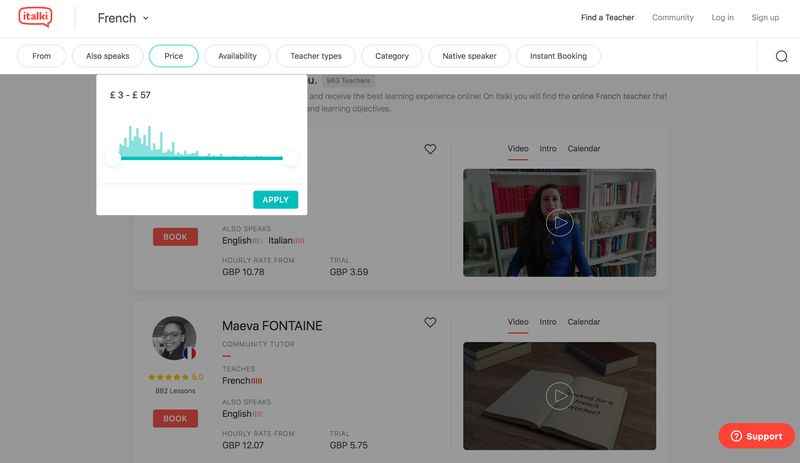How Long Does It Take To Learn French?
No matter your age, line of work or country of residence, there's no doubt that learning to speak French can enhance the quality of your personal and professional life tremendously.
Today, French is the sixth most widely spoken language in the world, with over 220 million French speakers across the globe.
Taking into account the many wonders of French culture (cheese and wine, for starters...) it’s no surprise that more and more people are wanting to learn French. After all, what better way to immerse yourself in one of the world's most fabulous cultures than to learn its language?
But how long does it take to learn French? What are the most effective language tools to speed up the process? And how difficult is it to learn? We'll start by answering the latter but, rest assured, we'll be providing you with the answers to all of these questions in the next few minutes...
Is French easy to learn?
Naturally, anybody interested in learning French will want to know how difficult it is to do so. Well, the answer is...there is no answer. Whether or not you find French easy to learn depends on several factors.
These include whether or not you're already bilingual, how much time you can commit to studying, and whether you are able to put what you learn into everyday practice.
The (perhaps) bad news is that you'll need to commit to learning French fully if you want to see notable progress. There are no half measures when it comes to learning a new language. The term 'go hard or go home' comes to mind...
The good news is that French is typically one of the easiest languages for English speakers to learn.
This is due to one main reason - French is part of the family of Romance Languages.
The Romance languages are French, Italian, Portuguese, Spanish and Romanian. If you speak English and/or at least one other Romance language, learning French will almost certainly be much easier for you than if you do not.
These languages share many linguistic and grammatical characteristics, which makes it easier for speakers of one of these languages to memorize vocabulary and grammatical rules belonging to another.
How long will it take to learn French fluently?
Ah, our favourite term - fluency. There is a great difference between learning to speak a language fluently, and learning to speak a language with fluency. The short and medium term goal should always be the latter.
The goal should be to be able to converse in French and hold everyday conversations with French speakers. That is, to speak with fluency. Generally, a reasonable expectation is 575-600 hours of study time. This equates to about 24 weeks and is enough time to become proficient in French.
Of course, the amount of time can vary widely on how quickly you pick up languages, how often you study and the French you have available.
Some individuals will develop French more quickly when they study with a native speaker. Others prefer to learn more independently.
If you've studied other languages, then you're probably familiar with the methods you'll need to adopt in order to master French.
 Levels of French fluency
Levels of French fluency
In order to set realistic expectations when learning French and tracking your progress, it is worth using the CEFR - The Common European Framework of References for Languages.
These levels are as follows:
Beginner (A1)
You are a Beginner in French. You can introduce yourself and understand basic phrases and familiar expressions. You understand French numbers. You are able to interact with French speakers in a simple way and have your needs met, as long as the speaker articulates slowly.
Advanced Beginner (A2)
Now, you are still a Beginner in French, albeit an advanced one. You can understand frequently used expressions in most intermediate areas such as shopping, family, employment, etc. You can exchange information with others relating to everyday life and routine.
Intermediate (B1)
As an intermediate French speaker, you can start to immerse yourself in conversations regarding family, work, school and other leisure-related topics. You can complete full sentences with comfort and travel without difficulty. You can understand others' opinions about a range of topics.
Upper Intermediate (B1)
You've reached an upper intermediate level. You can understand complex material if you are already familiar with the topic. You can now communicate easily with native French speakers and you can do so without thinking too much. You can use French effectively in a casual, academic and professional manner.
Advanced (C1/C2)
Bravo! You have mastered all aspects of French and can read, write and speak with total fluency. You can express your emotions and how you are feeling in a broad range of complex ways. You can understand and respond to almost anything you hear with ease.

What affects the length of time it takes to learn French?
While we have given you the rough estimated time on how long it takes to learn French, these time frames can be affected by a number of factors. Below are a number of factors which explain how learning French might take longer (or not) for you to learn than the timeframes that we have listed above.
Your first language
Your first language will depend on whether you find learning French harder or easier than others.
As we have mentioned, French is similar to English in many ways, which makes learning it much easier for English speakers than many other languages would be, such as Korean or Japanese.
How you are learning the language
The way you choose to learn French will determine how long it takes you to learn it. Many think that learning a language in the classroom is the best way to learn the language.
Whilst the academic approach is effective (it can shorten the process if you have a good understanding of grammar and structure) it is not always essential. Many language learners prefer interactive or immersive learning formats.
As with any language, it is important to find the best way to learn that works for you.
Your attitude towards learning
This point is pretty obvious, so apologies in advance.
Ultimately, your attitude to learning is certainly going to alter how long it takes you to learn a language. If you apply yourself and maintain a great attitude to learning French, you’re going to see results quickly.
So, if you want to learn French quickly, make sure that you go into your study sessions happy, well-rested, and ready to learn.
Effective Ways to Learn French Faster
If you want to expedite the process and learn French as quickly as possible, then it is worth considering some of these tips to help you along the way.
Set Smart Goals & Stick to Them
Learning any new language is a lengthy process and many individuals find it overwhelming. Unfortunately, French is no exception to this rule. The trick here is to set achievable goals that aren't overly ambitious and allow you to use the few words you pick up immediately.
To start with, try learning a few key phrases per study session, before increasing this number gradually.
Use French in Your Daily Life
Consistency can make a vital difference to the time it takes you to learn French. In order to give yourself the best chance of success and speed up your progress, try to use French in your everyday life. Even if it means just talking to yourself as you go about your day!
You can also learn the French words for items you use every day, including household items and objects you see around the workplace. Watch French TV with English subtitles (until you no longer need them), listen to French podcasts and read French children's books.
This amount of exposure to the language will help your brain to get used to the repetition of the words and make the sounds more familiar.
This level of consistency and engagement will also signal to your brain that this new information is important and valuable. As a result, it should become easier to remember and recall as needed.
Establish Language-Based Habits You Love
It may sound silly, but many people develop new habits when learning a language in order to keep themselves motivated. Why not do the same For instance, you could stop for a coffee and a pastry, visit a particular location or event and think about words or phrases in French that apply.
Anything that you can do to make French a consistent part of your life will help you learn it more quickly. What's more, these unique habits can make learning a language more fun, so you're more likely to stick with it. Just make sure that these habits are sustainable and not too expensive!
Use the Technology Available
Learning French doesn't mean lugging around textbooks. You can start learning French right away by downloading any number of language apps or even by changing the language setting on your phone.
Not everyone is brave enough to change the language on their devices. However, doing so can really help you to immerse yourself in the language. Also consider changing the language on your browser for a set amount of time each day, or find French learning activities online.
Using an app on your phone is probably one of the more popular ways to learn a language. Many of these apps use a gamified method which is proven to expedite your progress and incentivize learning.
Practice French Conversation
One of the best ways to speed up your French learning is by practicing French conversation. Tutor marketplaces such as italki provide you with a choice of dozens of French tutors at affordable prices. You can use the filter to search for your ideal tutor by price, availability and experience. Other tools such as Memrise and Duolingo are economic options.
How Long Does it Take to Get a French Accent?
Developing your French to a level that includes a native accent is not easy. English speakers, in particular, struggle with this particular aspect. However, there are several methods you can follow which will help you to develop an authentic French accent. After all, that's why so many of us want to learn French, right?
We've mentioned these tips above already. Watch as much French TV as you can! There are some excellent French series on Netflix, such as Marseille, Dix Pour Cent and Lupin. In addition to this, listen to as much French music as possible and read the lyrics (a quick Google search is usually enough) whilst listening.
Final Thoughts on Learning French
Well, bien joué! You've made it this far, so thanks for staying with us.
As you will see, there's no straight answer when it comes to how long it takes to learn French. While it may take you several hundred hours to begin to speak with fluency, there are a number of ways that you can expedite the learning process. Set clear goals, stay motivated and keep things fun. You'll be speaking French before you know it.








